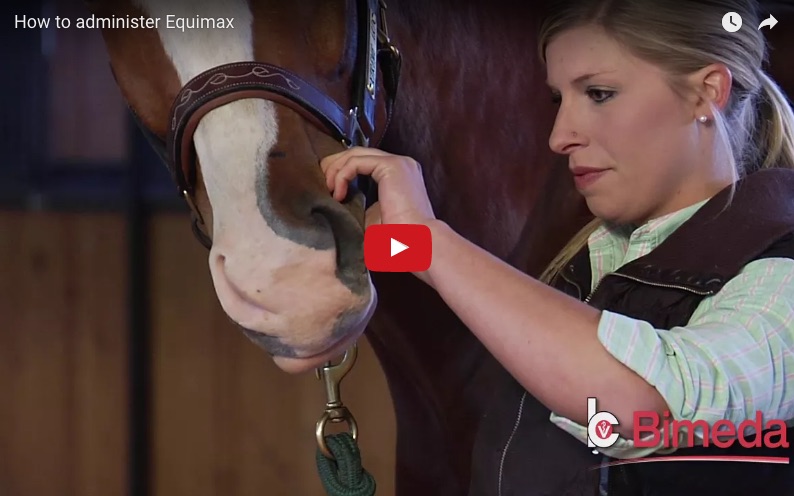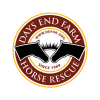
General (6)
Privacy Policy
This privacy statement discloses what information we gather about you when you visit our Site and describes how we use that information. Our policy is to keep the personal information we receive from our Site completely confidential and used solely for internal purposes. We will not share your personal information with any other parties.
Disclaimer
All trademarks are the property of Bimeda Inc, its affiliates and/or its licensors. Copyright © 2017 Bimeda Inc. All rights reserved. The product information provided in this site is intended only for residents of the United States. The products discussed herein may have different product labeling in different countries. The health information contained herein is provided for educational purposes only and is not intended to replace discussions with a healthcare provider. All decisions regarding patient care must be made with healthcare provider, considering the unique characteristics of the patient.
Collection of your Personal Information:
The personal information we collect may include your name, title, company or organization name, email, phone. We may collect certain information about your visit, such as type of browser you use; the date and time you access the Site; the pages that you access while at the Site and the Internet address of the Web site from which you linked directly to our Site. This information is used to help improve the Site and administer the Site.
Use of your Personal Information:
The personal information collected on this Site will be used to provide the services you have requested.
We may use your personal information to provide you with important information about the product or service that you are using, including critical updates and notifications. Additionally, we may send you information about other products and services.
Questions:
If you have any questions about this Privacy Statement or concerns about the way we process your Personal Data, please contact us at This email address is being protected from spambots. You need JavaScript enabled to view it. or 1–888–524–6332.
We may occasionally modify this privacy statement. All such changes will be reflected on this web page.
Contact
Bimeda US Office
One Tower Lane, Suite 2250,
Oakbrook Terrace, IL 60181
1 888 524 6332 (toll free)
630 928 0361
630 928 0362
This email address is being protected from spambots. You need JavaScript enabled to view it.
Equine Sales Representatives
Amy Bell
West
This email address is being protected from spambots. You need JavaScript enabled to view it.
Mark Glassford
South
This email address is being protected from spambots. You need JavaScript enabled to view it.
Rory Boren
Central
This email address is being protected from spambots. You need JavaScript enabled to view it.
Jim Conway
Southeast
This email address is being protected from spambots. You need JavaScript enabled to view it.
Archie McNeil
Northeast
This email address is being protected from spambots. You need JavaScript enabled to view it.
AAEP’s Parasite Control Guidelines
AAEP’s Parasite Control Guidelines
Commonly used strategies for parasite control in adult horses are based largely on knowledge and concepts that are more than 50 years old. However, much has changed in this time, necessitating a re-examination of recommendations for parasite control.
In response to this need, the AAEP’s Parasite Control Subcommittee of the Infectious Disease Committee in 2013 produced a comprehensive set of recommendations for helping veterinarians develop improved strategies and programs for parasite control in horses of all ages. In 2019, these guidelines went through a rigorous review with the committee and former subcommittee and were updated.
It is important to keep in mind that the information contained within these guidelines are suggestions; there are many variations of these suggested programs that will still meet the same goals and follow the same principles. Ultimately, each farm (with veterinary guidance) should develop its own program tailored to the specific needs of the farm and each animal. There is no such thing as a “one size fits all” program.
Guidelines are specified separately for adult and young horses (less than 3 years). All treatment and non-treatment recommendations are made within the context of a preventive program where fecal egg count (FEC) surveillance is being performed.
Read Parasite Control Guidelines.
Visit AAEP's Parasite Control Guidlines webpage
Equine Deworming Plan
Equine Deworming Plan
The recent increase in parasite resistance to commonly used deworming products has left the equine community concerned and in search of ways to slow down, if not reverse, the alarming trend. As parasites can pose a very serious threat to a horse’s health, including fatal situations, it is apparent that the commonly accepted approach to parasite control should be reconsidered. For example, the so called dewormer “rotation” is no longer an acceptable practice.
Strongyles, roundworms, bots, pinworms, and tapeworms are some of the parasites that veterinarians and horse owners deal with. Some of these can be identified easily, others not so much. That is why every treatment should start with analyzing fecal samples. The test is relatively inexpensive, and can provide a solid basis for choosing the right product that will ensure an effective deworming treatment. Every horse from the herd should be tested, but if the group is very large, then a proportionate test group may be used to gather samples from. The fecal test should be done once a year or at least every other year.
Statistically, horses can be categorized as follows:
| Number of eggs in a gram of fecal matter (EPG) | Category | Proportion relative to the herd |
|---|---|---|
| More than 600 (up to 3,000) | Heavy shedder | 20% |
| 200 - 500 | Moderate shedder | 30-40 % |
| 0 - 100 | Light shedder | 40-50 % |
If you test the whole herd individually you may find that not all horses carry the same amount and/or type of parasites. Some horses will carry a lot of worms and others much less. This is due to individual immunity, genetics, exposure level, and a variety of other factors. It may be a good idea to group horses based on the parasite type of infestation they have. This may help prevent further transfer of eggs and larvae between individuals.
There is no longer any fixed time chart or an ideal schedule for equine deworming. Instead, a proper deworming program will be based on the level of infestation and on the climate in your area. It is strongly recommended to perform a treatment after the first killing frost in the late fall to control bots and another round in the spring with a praziquantel- containing dewormer, which will provide a solid tapeworm control program. Note that this is the minimal treatment for the so-called light shedders.
| Category | Recommended frequency of deworming per year |
|---|---|
| Light shedder | 2 times per year (or no treatment at all) (late fall after the first killing frost and spring) |
| Moderate shedder | 3 – 5 times per year (late fall after the first killing frost and spring , plus when needed, usually in the summer season in the warm environments) Will benefit from one additional treatment during the main season of pasture transmission –spring through autumn in the North; autumn through spring in the South* |
| Heavy shedder | 5-6 times per year (approximately every other month) Intensive treatment required all through the main seasons of transmission* |
Always consult your veterinarian before treatment. Fecal testing can help determine the right product and the most effective way to treat your horses. The currently preferred drugs are pyrantel (not effective for tapeworm or bot treatment), ivermectin, moxidectin, and praziquantel (effective against tapeworm).
*Craig R. Reinemeyer, DVM, PhD, The Horse.com, “What is your Horse’s Fecal Egg Count Telling You?”, April 17, 2017
Resistance
Resistance
Resistance is the ability of worms in a population to survive treatment by a particular deworming chemical. Resistance grows when parasites survive treatment, and then pass the ability to survive on to their offspring.
Factors that influence resistance growth1:
- Under dosing.
- Deworming frequency.
- Using dewormers that do not kill resistant parasites.
Resistance can be reduced by:
- Use the proper dose and ensure the horse ingests the full dose.
- Deworm only when needed.
- Use dewormers that are effective. Studies have shown certain deworming classes, e.g. benzimidazoles have a high rate of resistance2.
80% of horses in a recent study3 whose weights were set visually were underestimated. Optimally, weigh your horse. This can be done when trailering, weigh your vehicle with your horse and without (scales can be found at feed mills, truck stops etc). If a scale is unavailable, weight tapes use a combination of a horse’s girth and height to estimate weight. Use care, weight tapes can be inaccurate for foals, miniatures and heavily muscled and high withered horses.
Know how many pounds the dewormer treats. This varies by brand, by as much as 20%. Round up to the nearest measurement and securely lock the syringe mechanism in place for that dosage.
Be sure once administered the horse ingests the full dose. This can be aided by raising the horses head and stroking under their jaw. Apple flavored dewormers can increase the ease of dosing, this can help reduce spit outs and other activities that prevent a full dose from being ingested.
- Sangster NC. Pharmacology of anthelmintics resistance in cyathostomes: will it occur with the avermectin/milbemycins? Vet. Parasitol. 1999; 85: 189-204.
- Kaplan RM. Anthelmintic resistance in nematodes of horses. Vet. Res. 2002; 33: 491-507.
- Asquith, R. Johnson, E. Kivipelto, J. and Depew, C. (1990). Erroneous weight estimation of horses. Proceedings of the annual convention of the American Association of equine practitioners. 599-607.
We stand behind our products, with the
Bimeda 100% Dewormer Satisfaction Guarantee
No-hassle satisfaction guarantee when you treat your horse according to label directions with any of Bimeda’s equine dewormers.
Return Instructions
If you are not satisfied with the level of parasite control that you received:
- Call Bimeda customer service at 888-524-6332 to obtain a guarantee claim number.
Satisfaction Guarantee claims must be made within one (1) month of administration and six (6) months of purchase. - Submit your itemized printed receipt for the purchase of Equimax®, Bimectin® or Exodus® Branded Products, date of product administration, product package and your Satisfaction Guarantee claim number.
- Your request will be reviewed and if all requirements are met, you will receive a product replacement or refund.
NOTE: Bimeda reserves the right to cancel or modify this guarantee at any time. Void where prohibited by law or regulation. All federal, state and local laws and regulations apply. Guarantee valid for horse owners only. Bimeda customers, Veterinarians, retailers and distributors do not qualify for this guarantee.
The Most Common Equine Parasites And The Damage They Cause.
Use the diagram or the parasite menu to learn more about each parasite.
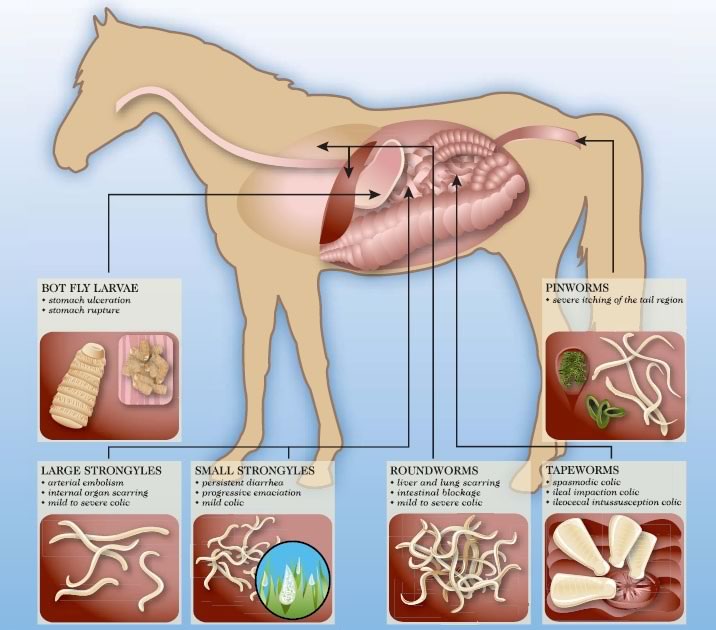
About EQUiMAX®
EQUiMAX® (ivermectin 1.87%/praziquantel 14.03%) is a broad spectrum parasite, bot and tapeworm control. It is safe to use in foals as early as 4 weeks of age, pregnant and lactating mares, and breeding stallions.
Indications
INDICATIONS
EQUiMAX® has broad-spectrum activity against a range of debilitating and performance-depriving parasites including:
- Tapeworms (Anoplocephala perfoliata)
- Large Strongyles (adults) (Strongylus vulgaris) also early forms in blood vessels), (S. edentatus) (also tissue stages), (S. equinus), (Triodontophorus spp.)
- Small Strongyles (adults, including those resistant to some benzimidazole class compounds) (Cyathostomum spp.), (Cylicocyclus spp.), (Cylicostephanus spp.), (Cylicodontophorus spp.)
- Small Strongyles (fourth–stage larvae)
- Pinworms (adults and fourth–stage larvae) (Oxyuris equi)
- Ascarids (adults and third– and fourth–stage larvae) (Parascaris equorum)
- Hairworms (adults) (Trichostrongylus axei)
- Large-mouth Stomach Worms (adults) (Habronema muscae)
- Bots (oral and gastric stages) (Gasterophilus spp.)
- Lungworms (adults and fourth–stage larvae) (Dictyocaulus arnfieldi)
- Intestinal Threadworms (adults) (Strongyloides westeri)
- Summer Sores caused by Habronema and Draschia spp. cutaneous third-stage larvae
- Dermatitis caused by Neck Threadworm microfilariae, Onchocerca sp.
Benefits
BENEFITS
- Apple flavored
- A smooth, quick-dissolving paste
- Broad spectrum activity against a wide range of parasites
- Proven safe in horses of all ages
- A single syringe contains enough active ingredients to treat horses weighing up to 1,320 lb
- Easy-to-use-and-handle syringe/applicator for more accurate dosing
Competitor Comparison
| EquiMax® | Other Available Brands | ||
|---|---|---|---|
| Active Ingredients | 1.87% ivermectin 14.03% praziquantel |
1.55% ivermectin 7.75% praziquantel |
2.0% moxidectin 12.5% praziquantel |
| Foals (minimum age) |
4 weeks | 2 months | 6 months |
| Breeding Stallions | Yes | No | No |
| Pregnant Mares | Yes | No | No |
| Lactating Mares | Yes | No | No |
| Syringe Dosage | Up to 1,320 lbs | Up to 1,250 lbs | Up to 1,500 lbs |
| Flavoring | Apple | No Flavor | No Flavor |
| EZE-Grip Syringe | Yes | No | No |
EZE-GRIP™ Syringe
Click the Spots!
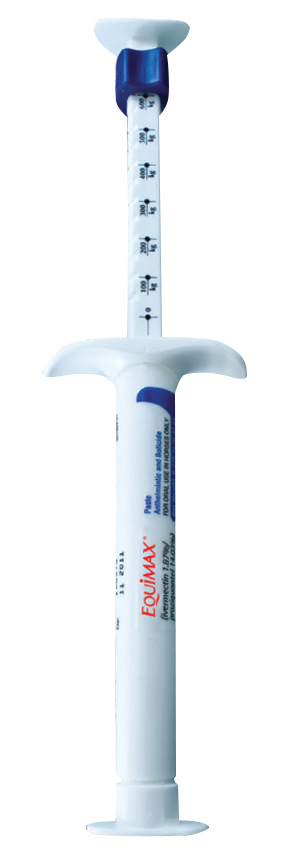
Apple Flavoring
We all know that horses love apples!
We also know that receiving the full dose of any medicine is fundamental in getting the complete benefit of the treatment. It is particularly important for antiparasitic treatments, for which under-dosing may increase the chances of those parasites developing resistance to the active ingredient, rendering it less effective over time.
 Horses are much more likely to ingest the full dose of medicine if it’s flavored pleasantly. Apple flavored de-wormers (such as Equimax®) can increase the ease of administration and ensure the horse receives the proper, full dose. This means less spitting, less product waste, better efficacy. Not counting a more pleasant experience for both owner and horse.
Horses are much more likely to ingest the full dose of medicine if it’s flavored pleasantly. Apple flavored de-wormers (such as Equimax®) can increase the ease of administration and ensure the horse receives the proper, full dose. This means less spitting, less product waste, better efficacy. Not counting a more pleasant experience for both owner and horse.
Who knew something as simple as an apple flavor can go such a long way!
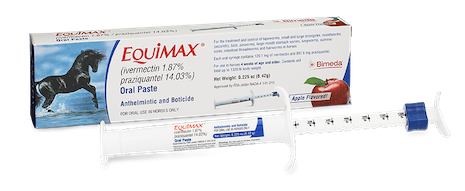
Available Pack Sizes
| Product Code | Unit Size | Case |
| 1EQU022 | 6.42g | 72 |
| 1EQU024 | 6.42g | 48 |
Documents To Download
For more information, please view the EQUIMAX® product information sheet.
Consult your Veterinarian to determine the best deworming program for your horse.
FOR ORAL USE IN HORSES 4 WEEKS OF AGE AND OLDER. EQUIMAX® (ivermectin/praziquantel) Paste should not be used in other animal species as severe adverse reactions, including fatalities in dogs, may result. Do not use in horses intended for human consumption. Swelling and itching reactions after treatment with ivermectin paste have occurred in horses carrying heavy infections of neck threadworm (Onchocerca sp. microfilariae), most likely due to microfilariae dying in large numbers. Not for use in humans. Ivermectin and ivermectin residues may adversely affect aquatic organisms, therefore dispose of product appropriately to avoid environmental contamination. Trademarks belong to their respective owners.




